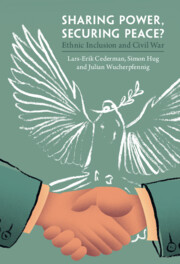Book contents
- Frontmatter
- Contents
- Figures
- Tables
- Preface
- 1 Introduction
- Part I Theories and Concepts
- Part II Analyzing the Effect of Power Sharing on CivilWar
- 4 Power Sharing and Civil War: Data and Baseline Models
- 5 Contrasting Formal Power-Sharing Institutions and Practices
- 6 Endogenizing Governmental Power Sharing and Its Effect on Civil War
- 7 The Strategic Logic of Governmental Power Sharing and Civil War
- 8 The Effect of Territorial and Governmental Power Sharing on Civil War
- 9 The Strategic Logic of Territorial Power Sharing, Secession and Civil War
- Part III Power Sharing and Civil War in Time and Space
- Bibliography
- Index
6 - Endogenizing Governmental Power Sharing and Its Effect on Civil War
from Part II - Analyzing the Effect of Power Sharing on CivilWar
Published online by Cambridge University Press: 23 June 2022
- Frontmatter
- Contents
- Figures
- Tables
- Preface
- 1 Introduction
- Part I Theories and Concepts
- Part II Analyzing the Effect of Power Sharing on CivilWar
- 4 Power Sharing and Civil War: Data and Baseline Models
- 5 Contrasting Formal Power-Sharing Institutions and Practices
- 6 Endogenizing Governmental Power Sharing and Its Effect on Civil War
- 7 The Strategic Logic of Governmental Power Sharing and Civil War
- 8 The Effect of Territorial and Governmental Power Sharing on Civil War
- 9 The Strategic Logic of Territorial Power Sharing, Secession and Civil War
- Part III Power Sharing and Civil War in Time and Space
- Bibliography
- Index
Summary
This chapter addresses the challenge of endogeneity, testing Master Hypothesis 4. Some critics of the grievance-based literature argue that endogeneity may undermine the link between exclusion and conflict, and by implication the opposite one linking inclusion to peace. Endogeneity derives from the fact that the governments' decisions to include or exclude could be motivated by the anticipation of conflict. We counter this threat to inference by articulating a causal pathway that explains ethnic groups' access to power independently of conflict. Focusing on postcolonial states, we exploit differences in colonial empires' strategies of rule to model which ethnic groups were represented in government at the time of independence. This identification strategy allows for estimating the exogenous effect of inclusiveness on conflict. We find strong and systematic evidence that - at least for the post-colonial world - inclusion in governmental power sharing systematically reduces the likelihood that ethnic groups become involved in ethnic civil war. Our instrumental-variable analysis confirms Master Hypothesis 4, because we have found that governments tend to co-opt potential rebels rather than excluding them.
Keywords
- Type
- Chapter
- Information
- Sharing Power, Securing Peace?Ethnic Inclusion and Civil War, pp. 97 - 125Publisher: Cambridge University PressPrint publication year: 2022

